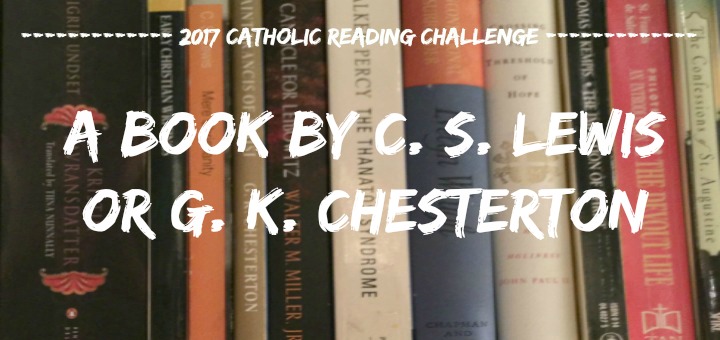I’ve been sharing what I’m reading throughout the year for the 2017 Catholic Reading Challenge, and I’m very excited to talk about this one…

Category: A Book by C. S. Lewis or G. K. Chesterton
My Pick: Mere Christianity by C. S. Lewis
If I was forced to pick my top five favorite authors, C. S. Lewis would have to be among them. His wisdom is inspired; his insights are timeless; his tone is, ahhh, so compelling. For the Reading Challenge I decided to re-read Mere Christianity. The first time I read it I was 18, and I still have that copy. It’s funny to see what passages I underlined and noted this time that were not marked before, but I disagreed with none of my previous markings of years ago. They would have all been underlined again (although without the unsteady, florescent highlighter pen).
Lewis must be the most-quoted Christian author of recent decades, and many of his famous passages that you have heard recited probably came from this book. Just for fun, here are a few examples:
“If you look for truth, you may find comfort in the end: if you look for comfort you will not get either comfort or truth — only soft soap and wishful thinking to begin with and, in the end, despair.”
~
“If the whole universe has no meaning, we should never have found out that it has no meaning.”
~
“Either this man was, and is, the Son of God: or else a madman or something worse. You can shut Him up for a fool, you can spit at Him and kill Him as a demon; or you can fall at His feet and call Him Lord and God. But let us not come with any patronising nonsense about His being a great human teacher. He has not left that open to us. He did not intend to.”
~
“Aim at Heaven and you will get earth ‘thrown in’: aim at earth and you will get neither.”
~
One remarkable thing about this book is that it is able to do two things simultaneously for which few other books or authors have the capacity: (1) present a compelling and reasonable apologetic of the Christian faith to the outsider, skeptic or atheist; and (2) unify all believers on what they share in common within Christian Orthodoxy. This ability to speak to both audiences at once is quite a feat. Since I’m not part of the former audience, I cannot speak to what one in that camp might have come away with, but I can tell you (as part of the later) what gift it has given to me.
This book is both a reassuring comfort and an awakening force. It soundly unpacks the reason and truth of Christian belief and practice, wrapping you in the warmth of faith as a mother would tuck in a restless child at night. But it also shakes you from patterns of spiritual pride or complacency as a father might yank the blankets off a slumbering teenager who has been too long in bed. You come away with both sensations together.
I will give you a couple of samples of each. In the first case, Lewis says:
“Very well then, atheism is too simple. And I will tell you another view that is also too simple. It is the view I call Christianity-and-water, the view which simply says there is a good God in Heaven and everyting is all right–leaving out all the difficult and terrible doctrines about sin and hell and the devil, and the redemption. Both these are boys’ phiolosophies. It is no good asking for a simple religion. After all, real things are not simple.”
In the second case, Lewis reminds us what Christ’s call is really requiring of us — perfection: perfection that we can only achieve through his sanctifying and actual grace working through us, but perfection none the less. In the chapter “Counting the Cost,” Lewis takes on the voice of Christ, saying:
“…if you let me, I will make you perfect. The moment you put yourself in My hands, that is what you are in for. Nothing less, or other, than that. You have free will, and if you choose, you can push Me away. But if you do not push Me away, understand that I am going to see this job through. Whatever suffering it may cost you in your earthly life, whatever inconceivable purification it may cost you after death, whatever it costs Me, I will never rest, nor let you rest until you are literally perfect–until my Father can say without reservation that He is well pleased with you, as He said He was well pleased with me. This I can do and will do. But I will not do anything less.”
It is so easy to get to plateaus in the Christian life and be satisfied with how “good” you have become and consolled that vices have been somewhat improved with virtue and habit. As Lewis puts it, we feel “good enough.” But this is the “fatal mistake,” he says. “We may be content to remain what we call ‘ordinary people’: but He is determined to carry out a quite different plan. To shrink back from that plan is not humiility: it is laziness and cowardice. To sumit to it is not conceit or megalomania; it is obedience.”
I think I must leave it there. If you have not read this wonderful book, I encourage you to do so sooner than later. I think you will find yourself revisiting passages again and again, and coming away with new insights.
What Book by C. S. Lewis or G. K. Chesterton did you read for the #2017catholicreadingchallenge? If you are posting your pick on social media, remember to use the hashtag!
Copyright 2017 Jessica Ptomey
